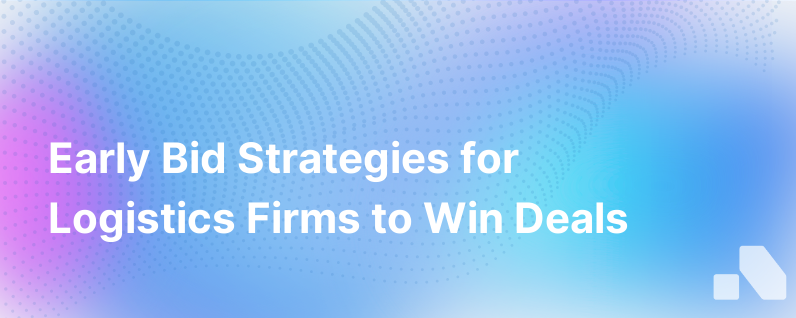How Logistics Companies Can Get Into Bids Early And Increase Their Chances Of Winning The Deal
Published on August 29, 2023 by David Zhang
In the competitive realm of logistics, getting an early start in the bid process is more than a head start—it's a crucial strategic advantage. Companies that secure a position at the negotiation table before the formal RFP process begins often shape the client’s expectations and criteria, increasing their chances of clinching the deal.
Understanding the Playing Field: The Logistics Landscape
Before diving into strategy, it’s critical to understand the logistics industry's nature. It’s a unique fusion of complex service delivery, the need for technological adeptness, and highly time-sensitive operations. Contracts aren’t one-size-fits-all; they are highly tailored to cater to each client's requirements.
Getting into Bids Early: The Strategic Roadmap
1. Market Intelligence and Prospecting
To get a seat at the table early, you must be aware of potential opportunities as they arise—or even before. Dedicate resources to:
- Prospecting Tools and Platforms: Invest in software that tracks potential RFPs and contracts nearing their end across various platforms.
- Industry Networking: Foster relationships with industry insiders who can provide advanced notice of upcoming RFPs and leads.
- Competitor Analysis: Be aware of competitor contracts and their durations. Mark upcoming expirations and be ready to position your offering.
2. Building Meaningful Relationships
Business is conducted between people, not faceless entities. Building solid, meaningful relationships with potential clients can be a gateway into discussions before formal processes ensue.
- Leverage Existing Relationships: Reach out to current clients for referrals and introductions. They can often provide bridges into new opportunities.
- Engage in Industry Events: Attend conferences, trade shows, and seminars to meet potential clients and understand their upcoming needs.
3. Thought Leadership and Education
Position your company as a thought leader within the logistics space.
- Publish Insightful Content: Whitepapers, case studies, and industry analyses can showcase your expertise and reach clients considering logistics solutions.
- Conduct Webinars and Workshops: Create educational opportunities to help businesses understand the logistics market, thus positioning your company as a knowledgeable and reliable partner.
4. Offering Consultative Support
Sometimes the best way to win a client is to start by helping them figure out what they need.
- Consultative Logistics Audits: Offer to audit a potential client’s current logistics scenarios and suggest improvements, establishing trust and showcasing your capacity for value-add.
- Solution Optimization: Demonstrate how your services could optimize their logistics through custom solutions or introducing cutting-edge tech solutions.
5. Utilizing Technology
As a logistics company, you must stay at the forefront of technology, both in your operations and in your client engagement strategies.
- CRM Systems: Implement a robust customer relationship management (CRM) system to track interactions, sales pipelines, and client histories.
- Analytics: Leverage analytics to better understand market trends and customer behavior, allowing you to anticipate needs and be proactive in your engagement.
6. Early Solution Crafting
Work on tailoring your solutions to potential clients even before the RFP is out.
- Customized Service Packages: Create flexible service templates ready to be tweaked and presented at a moment’s notice.
- Value Proposition Alignment: Align your offerings to the potential client’s corporate strategy and pain points, creating solutions that resonate on a deeper business level.
7. Polishing the Pitch
An early pitch isn’t necessarily a formal proposal but rather an opportunity to highlight your company’s strengths and compatibility with the client’s needs.
- Craft an Elevator Pitch: Develop a concise pitch that clearly articulates your unique value proposition.
- Prepare Case Examples: Ready case studies and testimonials that highlight past successes and align with the prospective client's industry or need.
8. Timing and Persistence
Impeccable timing can be the difference between merely competing and actually winning.
- Follow-Up System: Establish a system for regular, non-intrusive follow-ups to stay top-of-mind with potential clients.
- Opportunity Alerts: Set up internal mechanisms that trigger engagement when certain market signals indicate a bidding opportunity might arise.
Best Practices for Bid Participation
Once you're in the consideration set and the bid is in play, follow these best practices to maximize your chances:
- Collaborative Bid Development: Work with the potential client to understand and shape the RFP.
- Risk Mitigation: Identify and address any perceived risks in choosing your company.
- Outcome-Focused: Focus on the business outcomes your logistics services enable rather than the features of the services themselves.
Conclusion
Breaking into the bid process early in the game can seem an elusive goal, but it's achievable with the right mix of proactive market analysis, relationship-building, and technological leverage. Employing a comprehensive strategy that encompasses understanding client needs, providing consultative support, and maintaining persistence in engagement will significantly enhance your chances to win logistics bids.
Transforming your bid approach from reactive to proactive doesn’t just increase your win rate—it positions you as a strategic partner rather than a vendor. By fostering early engagement and intertwining these strategic insights into your sales process, you are more likely to secure your role at the negotiating table, well before the bidding starts.